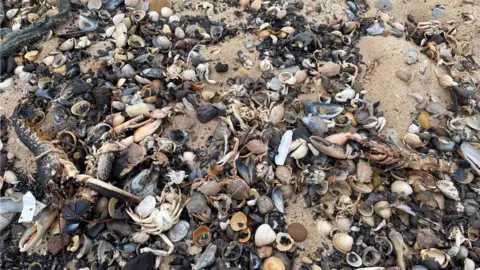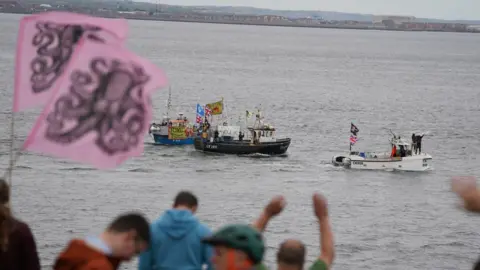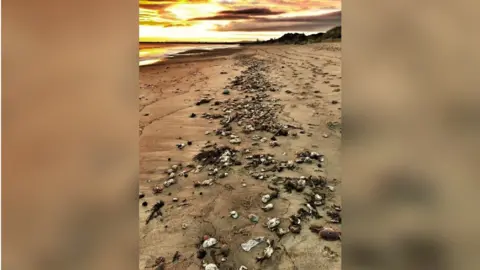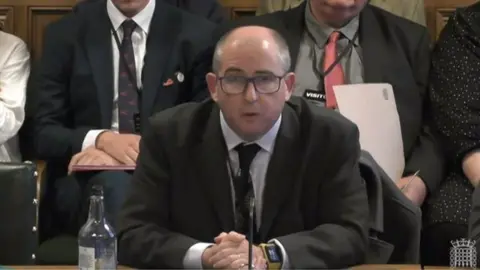Crab death: Academic calls for Teesside freeport dredging to be paused
 Sally Bunce
Sally BunceDredging to create a freeport on Teesside should be paused until a map of chemicals in the river bed is made, an inquiry into crab deaths has heard.
The government says a naturally-occurring algal bloom was the most likely cause of thousands of shellfish deaths on the North East coast in 2021.
Academics blame a toxic chemical released by dredging.
A parliamentary committee said the "disaster had had a profound effect" with more research needed.
The Environment, Food and Rural Affairs Committee heard experts from both sides of the debate say there was no definitive cause identified for the mass wash ups between Seaham and Robin Hood's Bay in October 2021, but inshore fishermen told MPs their catches had been "decimated".
Hartlepool-based fisherman Stan Rennie, of the North East Fishing Collective, told the committee it was "absolutely devastating" while Joe Redfern, of the Whitby Commercial Fishing Association, said there was a "real sense of hopelessness" in the fishing industry.
Rachel Hartnell, science director of the government's Centre for Environment, Fisheries and Aquaculture Science (Cefas), said a combination of two naturally-occurring algal blooms was the most likely cause.
Ms Hartnell said the official investigation was closed because "there was no further evidence anything else" could be the cause, although she said the agencies would "test the hypothesis" put forward by academics at Newcastle, Hull, Durham, and York Universities commissioned by the fishing industry.
Their theory is that dredging in the mouth of the River Tees released a chemical called pyridine, which was prevalent in various industries on Teesside and which tests showed was "exceptionally toxic" to crabs.
Mark Rice, deputy director for water and land quality at the Environment Agency, said water was tested for possible pollutants but no pyridine was found, with none detected for several years.
 PA Media
PA MediaHe said there would have to have been a "significant release" which investigators "would have identified".
Dr Gary Caldwell, of Newcastle University's School of Natural and Environmental Sciences, said looking for the chemical in water was a "fool's errand" as it quickly dilutes like a "thief in the night", and it needed to be searched for in sediment.
Ms Hartnell said pyridine occurred naturally in crabs and a healthy crab with much higher levels of the chemical than those found in the dead Teesside ones was found in Norfolk.
MPs were told the dredging being carried out at the time was regular maintenance work done six days a week to keep the river navigable for ships.
Jerry Hopkinson, chairman of PD Ports, said such dredging had been done for "40 to 50 years" with no mass mortality event happening ever before.
 Paul Grainger /PA Wire
Paul Grainger /PA Wire He said the dredging at the time was more intensive than usual after a slippage on the river bed, but that it was done in accordance with best practice to a depth of 14.6m (47ft) along a 2km-long stretch.
Mr Hopkinson said he took environmental responsibility and the concerns of the fishermen extremely seriously but he did "not believe" the dredging was "causal" but rather "coincidental".
MPs heard more dredging work is planned for the creation of the Tees Freeport, which is billed to bring jobs and investment to the area.
Dr Caldwell said until there is a comprehensive survey of what chemicals lurk in the river bed dredging work for the Freeport should be paused.
He said he had no issue with maintenance dredging continuing except, as in October, when there was a large natural slippage that could release deeper-lying chemicals.
 Parliament TV
Parliament TV"We need to understand what chemicals are present," Dr Caldwell said, adding: "It would be quite a silly thing to do to release chemicals without understanding the nature of the risk."
He said mitigation procedures could be put in place once it was known what chemicals were present.
He also said he had received a letter from three government departments asking for his data "so we can work together to stop the dredging of the South Bank", adding similar surveys should be carried out in all rivers with industrial heritages.
Committee chairman Sir Robert Goodwill, MP for Scarborough and Whitby, said while there was debate about the cause of the "ecological disaster" there was no argument about the "profound effect" it had on the fishing industry.
He said: "We need to think very hard about what we've heard, ask some very important questions [of government] and find out what more can be done.
"There is more research to be done to find out what exactly happened and not just draw a line under it."

Follow BBC North East & Cumbria on Twitter, Facebook and Instagram. Send your story ideas to [email protected].
